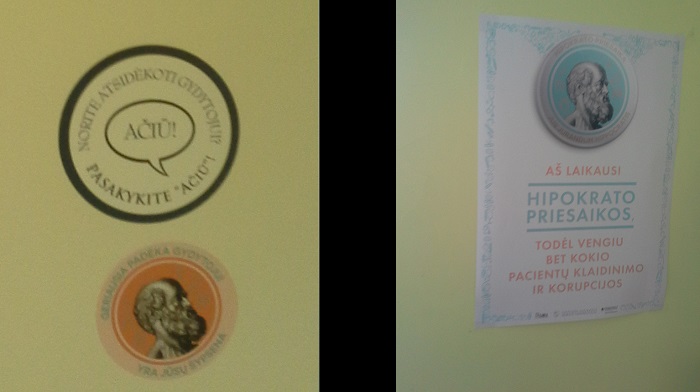Healthcare in Lithuania
Healthcare of Lithuania is of a formidable standard with the number of doctors per 1000 people larger than in most Western societies. Hospitals are well-equipped to perform even the most difficult surgeries. The doctors are well-trained and sought-after by Western hospitals.
For Lithuanians and people of the European Union, most medical services are free of charge. However, corruption is rampant, meaning that a person with relationships among doctors (or a bribe) may get preferential treatment bypassing the queues (which may get long, depending on location and procedure). This used to be the norm in the Soviet Union when all goods and services were, in theory, equal-to-all but, in reality, depended on bribes and relationships; today, such practices are declining.

Adverts against corruption in the Vilnius clinics. The signs, aimed both at doctors and patients and available on many cabinet doors, declare: 'Do you want to show gratitude to the doctor? Please [just] say THANK YOU', 'The best gratitude to your doctor is your smile' and 'I follow the Hippocratic Oath, therefore I avoid patient disinformation and corruption'. ©Augustinas Žemaitis.
This, as well as the Soviet "patient-is-always-wrong" attitudes in some public hospitals (also declining), makes a part of the population pay the full price at the private clinics (even though they are still subjected to massive compulsory public healthcare taxes). The likelihood of choosing a "private doctor" heavily depends on the medical services needed: nearly everybody visits a private dentist or gynecologist just as nearly everybody uses public hospitals for major surgeries. For a foreigner, private hospitals may be less of a hassle in all cases especially if one has insurance coverage for them. Even without such coverage, many procedures may be cheaper in Lithuania than in the West. Lithuanian emigrants come back to perform non-urgent medical procedures (dentistry, plastic surgery) and there is some medical tourism into Lithuania.
If you choose public hospitals, the best ones (and the largest) are in Vilnius and Kaunas.
Lithuania has a wide range of health resorts and spas, especially in Druskininkai resort. These tend to vary in quality from Soviet-level facilities (sometimes still state-owned) to modern facilities (private), therefore do your research before committing to spending a week somewhere. Like with hospitals, often it is the attitudes of the personnel that makes the difference (rather than the quality of the procedures, which may be good everywhere).
People enjoying a free relaxation in the Birštonas spa resort. ©Augustinas Žemaitis.
There is generally no need to get any vaccination before going to Lithuania. Major infectious diseases such as Hepatitis B, Hepatitis C or HIV are extremely rare.



January 25th, 2015 - 12:21
This is a warning to any expats that may find themselves ill here in Lithuania: When I first became ill, I was passed from one doctor to the next – with none of them recommending anything except multiple exams and medications – and the 7-8 doctors I saw all wrote different and conflicting diagnoses in my health booklet, but none considered it serious enough or cared to do anything more. Finally I collapsed one day, bleeding internally, and was taken to the hospital, where they did a sloppy ileostomy surgery and left me to die in a re-animation room. After 1 month in a coma, I woke to find that my legs had been allowed to atrophy and I was covered in bedsores. While I was transferred from department to department as I recovered, I found that no one ever appeared to know much about me – so much for “reading a patient’s chart” or caring.– and the simple fact that forgot to take out my stitches on time – and when they did, missed and forgot to take out a couple stitches, is just one example of what sloppy ignorant care they are capable of. The absolute worst thing is that no one could speak English – as I am an American, and my Lithuanian and Russian are very poor – especially in trying to indicate what was wrong with me. The highest level of English was very low, and this was from only a handful of doctors and nurses. After a while, my wife and I noticed that all the relatives and patients were constantly giving “gifts” to the nurses and doctors – everything from candy to straight cash. The level of care and attention I received improved a little as soon as I started giving the medical staff “gifts”. i have been able to re-learn to walk a little, but I am still very weak and will never be as healthy as I used to be. They left me with an colostomy that doesn’t work well, and I am in constant pain and discomfort from all the complications that occurred from the poor care and attention I received. The things that happened and the situations I experienced in the Hospitals are simply too ridiculous to believe. Some of the nurses and doctors should lose their jobs or be punished for what they have done. My experience has been unbelievable and horrible in many ways, and I am lucky to be alive! I could write several pages about the completely idiotic things that happened to me, but the most important thing to understand is that Lithuanian healthcare is not very good at all unless you can bribe your way through it. Everything is “all show and no go” at the medical hospitals and facilities.
February 21st, 2017 - 11:10
Hi,
After having experienced/being experiencing a real drama with the Lithuanian health care system (and doctors!) I agree absolutely with all what you said. The problem is that at the moment I do not know what to do and to whom trust.
Asking most lithuanians about doctors has proved to be completely useless because they think their medicine is good in general and that there is nothing wrong with it.
I would be grateful if I could contact you. Is it possible ?
I am also a foreigner living in Lithuania for some years now.
Best
Esteban
March 2nd, 2017 - 05:55
Depending on what particular questions you may ask them here as well. While Lithuanian doctors are good, the corruption within the medical system is a problem (and I think many Lithuanians recognize this too). As such, some good doctors simply purposefully underperform for those who give no bribes.
October 3rd, 2015 - 09:45
DeadManWalking (An update in response to a request)
October 3rd, 2015 – 08:25
Dear Juliette – Yes, be scared, but here’s some advice that will help you avoid the worst of the Lithuanian Public Healthcare system.
1. Don’t use or enter the Public System – contract with a private clinic and pay them “gifts” upfront before you go under their care. Avoid Klaipeda, and if possible, travel to the Kaunas and Vilnius clinics – they are far superior.
2. Don’t count on being able to communicate with them in English – the level that a few can speak is so low, that misunderstandings can happen easily – especially with nurses – remember that a nurse is one of the lowest paid professions in Lithuania, and that nurse training institutions don’t emphasize learning foreign languages – when it comes time for a new nurse to graduate, a simple gift to the right teacher will assure that a lack of English is overlooked.
3. Attitude towards patients – due to the old, soviet mindset, which still exists to some extent, you may ignored if you ask questions or complain – “the customer/patient is always wrong”. Imagine telling a nurse that a bandage or dressing is causing extreme pain, or that a fluid transfusion has been done incorrectly, missed the vein, and that your leg, or foot is swelling up. Don’t be surprised if they yell at you in frustration that a patient should question them.
4. Arrange for an advocate that can speak fluent Lithuanian and English – someone you can contact quickly if needed – pay them good money, and make sure the staff know you have this person available, and that they can also contact them.
5. Again, I have to stress communication – you may be told that your care staff “speak English”, but due to the their lack of practice, the actual level and medical vocabulary may be limited – For example, the Klaipeda Seaman’s Hospital has a plaque prominently displayed in its gastrointestinal reception floor on the wall, proudly proclaiming the international language proficiency of its staff – it’s bullshit. Like I said, “all show, no go”.
6. In most facilities, you are expected to provide ALL supplies – toilet paper, paper towels, bottled water, towels, soap, sometimes even medical supplies, etc. One time I ran out of paper towels, and a nurse refused to change my leaking colostomy bag until my wife ran to the nearest shop, bought some, and came back.
7. If a nurse or staff member becomes hostile to you, contact your advocate immediately and register a complaint/pazymas – don’t threaten them – do it.
Lithuanian Hospital staff responsibility for their actions/negligence is rated as one of the lowest factors for all EU Nations. Hospitals are very rarely ever sued for malpractice here, and they are quick to manufacture evidence that they were never responsible – things get hushed up really fast.
Knowing these things – I would emphasize again to NOT ENTER the Lithuanian Public Healthcare System at all, if you can avoid it. Plus, there may be little or no arrangement for aftercare once you leave – my feet and toes were in horrible shape by the time I left the hospital – again, stupidly, I trusted the advice of Mano Seimos Gydytojas (My local family doctor for our area) who sent me to a public clinic where they didn’t even have the proper medical equipment to deal with the ingrown toenails and damage – the old, Russian nurse who worked on my feet cried and apologized the whole time she painfully used what looked like a pair of metal cutters to chop off parts of my toenails. (Later, I did the work myself at home with a Dremel tool and a set of X-Acto knives).
Yes – there are plenty of trolls and ignorant people on this forum that will tell you that they had a procedure done well, and they were very happy with the results – But, if you will have a serious, dangerous procedure – Don’t Take Any Chances!
Why do I call myself DeadManWalking? It’s because my wife was told “Why do you keep visiting and asking us over and over about him? – He’s going to die. This demonstrates Lithuanian diplomacy and empathy in their Public systems – and when I insisted on an aftercare visit to assess the damage caused to by abdomenal wall from them forgetting to take out some sitiches, the surgeon who did the the second operation, as the 1st was a failure, Dr. Razbadauskas’s first words were “What, You are alive!? He was surprised I has survived his “expertise”.
April 3rd, 2018 - 06:09
Hello,
It’s my immense pleasure to go through your profile.
We organize an International Conference on Gastro Education which is to be held on September 06-07, 2018 at London, UK. Gastro Education 2018 will be organized under the theme “Exploring Novel Innovations and cutting edge technologies in the field of Gastroenterology’’ which covers wide range of critically important sessions.
We officially invite all the interested participants to be a part of the conference, for more details check on: https://gastroenterology.euroscicon.com
Thank you
January 16th, 2020 - 12:16
hello,
Gastroenterology Conferences Team takes pleasure in inviting the scientific community across the globe to attend the 16th Edition of European Gastroenterology and Hepatology Congress on June 15-16, 2020 at London, UK with a motto to Explore Innovations in Gastroenterology and Hepatology
The gathering will address sustainable developments in the area of Gastro Education and Hepatology, while laying emphasis on innovative methodologies in gastroenterology and hepatology. Gastroenterology Conference 2020 will be the best venue for academicians, researchers and interested parties to discuss proposals and advancements in gastroenterology and hepatology conduct.
April 2nd, 2020 - 15:53
Dear All, I am from the Netherlands and live currently in Vilnius. During this difficult time for everyone, it’s more difficult to buy prescription medicines these days. Especially when you have no regular doctor in Vilnius, like me. I need urgently, latest tomorrow Friday 3 April 2020, Seroxat or Paroxetine (20mg). I can not function without it. I prefer no consult because of A. I use this medicine already 5 years. B. It takes a lot of extra time and money. How can I solve my issue? Is there anyone who can advise me what to do? Kind regards, Michel
April 7th, 2020 - 14:05
In these times of the lockdown, everything is new as there was no such lockdown any time before. It is still the best to call the clinics of the area, or, if it is a medical emergency without them, to call 112. That said, it is best if you would find somebody able to speak Lithuanian as people in those services would not necessarily speak English.
May 12th, 2020 - 05:59
Gastroenterology Conferences Team takes pleasure in inviting the scientific community across the globe to attend the 18th Euro-Global Gastroenterology Conference on SEP 21-22, 2020at Amsterdam, Netherlands with a motto to Navigating the Future of Gastroenterology.
August 5th, 2021 - 10:34
I dunno if this is the right place for this question, but what are the services available for an older lady terminally ill? what is the support in Lithuania? is it all private or is there some charities that can help the family of the person to get to a good end of life?
at the moment she is on a state care home and it’s been pretty shit for her..
August 7th, 2021 - 05:16
From what I understand, she probably already uses the state support available, i.e. state care home. There are also alternatives (hospices) from religious charities, e.g. https://www.hospisas.lt/hospisas/ . There also may be private institutions but these are paid and typically not enough to be funded by the person’s pension. In general, in Lithuania, there is a rather small supply of these services mainly because in Lithuanian culture kids/grandkids are generally expected to care for the elderly instead of e.g. signing them up to a senior residence.
August 10th, 2021 - 12:47
oh ok, thank you Augustinas. I think the issue is when you don’t have enough family members to support a person who is bed ridden. 🙁
yeah unfortunately there are not much gov support for terminally ill patients in Lithuania. Which is a shame
Do you know a website or a list of individual carers that could be paid from the family to look after and live with the patient by any chance ?